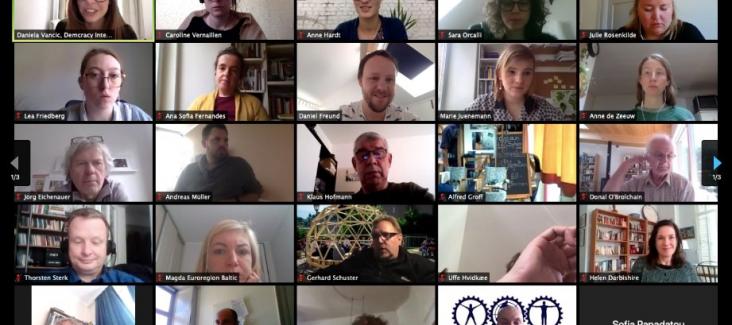We firstly looked at how elections have been challenged by Covid-19. These challenges are registration for elections, campaign financing, information campaigns and voting. Our discussion mainly covered the 2020 United States Presidential Election, which will have far-reaching importance not only for the USA, but for the entire world. In our discussion, experts spoke about the importance of ensuring that all voters know about the registration process for mail-in voting and the sending of mail-in ballots. The civil society organisation Voters not Politicians has been running a number of campaigns in order to make sure that proper democratic procedures are followed in the upcoming election. During Covid-19, it has also been observed that smaller parties have been finding it more difficult to finance campaigns. Therefore, a drastic rethinking and re-evaluation of financing is needed. This entails making use of online campaigning, crowdfunding and online information campaigns.
We also identified several issues related to direct democracy which have become more pronounced over the last months. Organisers of initiatives have found it difficult to gather signatures and raise awareness for causes. As a recommendation, administrations should allow for online registration for direct democratic votes, as well as providing extensions for signature gathering deadlines. Citizens should not allow themselves to become disheartened by the situation and should coordinate with civil society to gather signatures and run campaigns via online infrastructure. Citizens should also use this lockdown time to become even more informed about the process of direct democracy and to develop practical plans for future initiatives.
Thirdly, we looked at issues surrounding data protection that have become pertinent during the global health crisis. This especially relates to tracking apps that were introduced in many countries as a way of tracking and slowing the spread of the virus. However, in many countries, there are concerns about how the collected data will be used and how it could infringe on the rights and privacy of citizens. From our discussions, we made a number of concrete recommendations to ensure better data protection when using Coronavirus tracking apps, such as asking for individual consent and automatically deleting data after certain periods of time.
Separation of powers in government was discussed in the fourth discussion. We spoke to experts from many countries where the Covid-19 crisis has caused democratic backsliding and abuses of power. In many cases governments exploited states of emergency to rule by decree, thus bypassing legal procedures for enacting new legislation to solidify their power. From our discussions, it became clear that countries with stronger and more resilient democracies are less susceptible to these types of abuses of power during times of crisis. This suggests that democracy should also be improved by adding direct democratic participation to hold politicians accountable for their actions. If democratic structures are more robust, it is less likely that the above-mentioned transgressions will occur in times of crisis. In her book Krisendemokratie, Tamara Ehs also argues for the establishment of a Finnish-style parliamentary committee on the future to develop medium and long term strategies. In Finland this committee also combines the opinions of experts with public sentiments. Therefore, it can discuss issues and provide guidance on potential obstacles before they become a problem.
We facilitated two discussions on press freedom and transparency. The spreading of fake news was identified as one of the biggest challenges during current times. It is, however, very difficult to regulate fake news through legislation outside of existing libel and defamation laws. Our main recommendation is for people to become “media and information” literate so that they are able to determine the veracity of information after looking at reliable and verifiable data. Public debate and transparency of decision-making have also suffered due to the Covid-19 restrictions. From our debates, we recommended that people campaign for more direct democracy using pre-existing tools and working together with civil society organisations such as Open Government Partnership to inspire change in democratic systems and engage in debates with politicians.
Finally, with public life coming to a halt, citizens’ assemblies and citizen dialogues have faced hindrances with in-person meetings not being possible and governments making swift decisions without public input. During our discussions it was recommended that citizens’ assemblies move to cyberspace following the example of France and the UK where recommendations for Covid-19 assemblies took place online. Technocratic Governments should also recognise that democracy has changed over the last couple of decades and that they should install a system of citizen dialogue and make use of the results of these dialogues in a concrete way when shaping legislation.
This article provided a summarized version of the challenges and recommendations we received during our highly thought-provoking discussions over the last 6 weeks. We would like to stress that these recommendations have emerged from our constructive dialogues with experts and participants and that they are susceptible to change as the Covid-19 situation dynamically develops. Visit our website for the full recommendations and recorded interactive discussions. The recommendations will also serve as a topic of discussion during the upcoming online Global Forum on Modern Direct Democracy from 21-29 September 2020.
We're looking forward to continuing the debate, coming up with further suggestions and working towards ensuring proper citizen participation in the form of direct democracy at the online Global Forum on Modern Direct Democracy!

